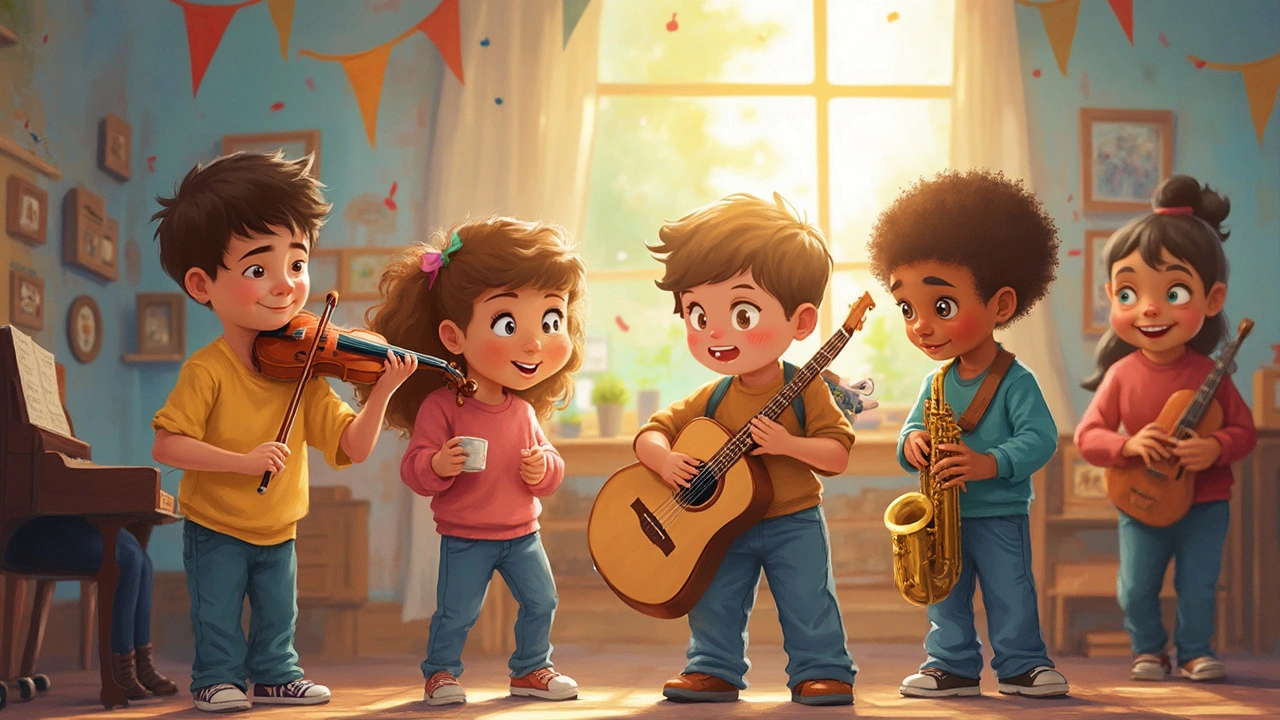At a time when self-doubt seems to hang in the air thicker than smog, there's this almost magical secret weapon that often flies under the radar: musical instruments. Think about how a shy kid discovers a guitar and suddenly can’t help but show off a new riff at a family party. Or picture an adult who finally picks up drumsticks after years of thinking they’re too old to learn, then ends up walking taller than ever. Musical instruments don’t just create music—they carve out new confidence from people who thought they didn’t have it in them. Turns out, holding that trumpet or sitting at a piano goes way beyond the music itself.
Why Musical Instruments Boost Confidence—The Science Behind the Sound
It’s not just a gut feeling that making music makes you more confident. Scientists have dug into this, and the numbers back it up. A study published in the "International Journal of Music Education" followed students for a year and found that those in school bands and orchestras scored considerably higher on confidence tests compared to those who didn’t play instruments. What’s more, brain scans show that when you play music, your brain lights up in more areas than it does when you’re doing almost any other activity—including sports and reading. This mental workout gives you a sense of accomplishment you just can’t fake.
There’s also this sweet side effect: The act of learning something new, especially something complex like instrument-playing, rewires your brain for resilience. When you stick with practice, push through mistakes, and see yourself improve, you start to trust yourself more—not just with music, but with life’s curveballs, too.
Take this fact: kids who play instruments for just two years are, on average, 17% more likely to raise their hands in class and voice their opinions, says a 2023 survey done across primary schools in Canada. Imagine what that means for real life—kids who once stayed quiet suddenly speak up, not just about music, but about anything.
| Aspect | Confidence Impact Observed | Measured in Study |
|---|---|---|
| Solo Performances | Improved presentation skills & reduced anxiety | By 33% |
| Group Playing | Higher teamwork and collaborative confidence | By 27% |
| Long-term Practice | Increased persistence & self-belief | By nearly 40% |
Skeptical? Ever hear of the so-called “Mozart Effect”—the buzz that listening to Mozart boosts intelligence? Turns out, playing music trumps just listening, at least when it comes to confidence gains. When you physically interact with an instrument, your brain forges fresh notes and neural pathways, which you don’t get from passively taking in music.
From Bedroom Rockstars to Confident Public Speakers—How Instruments Shape Real Lives
Most people expect that, yes, maybe practicing the violin sharpens focus or finger muscles, but the ripple effects go way further. Let’s get specific. Picture a twelve-year-old who barely speaks up in school—quiet, nervous, wants to blend in. After he joins a beginner jazz class and learns drums, he gets hooked on the challenge of steadying his rhythm with the group. At first, he’s terrified of screwing up. But something clicks: after a month, making it through song after song, being cheered on by friends, he walks into school ready to tackle reading aloud.
I’ve seen teens who were terrified of public speaking now happily lead meetings—and they all point back to performing at piano recitals as their first brush with confidence. Doesn’t matter if it was in front of five people or fifty. That thrill of preparing, showing up, and surviving—even if it wasn’t perfect—shows people, especially introverts, that their voice matters.
Adults aren’t immune to these changes. Think about someone who never played as a kid and dives into a beginner ukulele class at forty. Maybe their hands are clumsy, and the first few sessions are nothing but awkward fumbling. Little by little, they master a single song. Next thing you know, they’re teaching their own kids a few chords or posting a video online. The best part? That new confidence doesn’t just show up when playing music. One recent survey from the UK found that 71% of new adult musicians reported more courage in job interviews and work meetings within half a year of learning.
That confidence travels. You might start practicing piano to impress your friends, but you wind up asking for a raise at work because you’re used to stretching your limits. Instruments train your brain to be a bit braver everywhere.

Breaking Down the Confidence-Building Process
Sure, we can talk about “confidence” all day, but how exactly do instruments drive this? Let’s break it down with real examples. First, there’s the learning curve itself. You pick up a guitar for the first time, and your fingers feel like they belong to someone else. Strings buzz and clang, notes sound off, your favorite song is barely recognizable. Yet, every practice session chips away at that clumsiness. Slowly, fingers start to move where you want—and even those ugly sounds turn into your own music.
This daily grind of failing, figuring things out, and finally succeeding works like compound interest. Each tiny win—playing a chord cleanly, hitting the right note—teaches your brain, “Hey, I can do hard things if I stick with them.”
Performance is another huge boost. The first time you play in front of anyone (even just a friend), you might shake with nerves. Your heart pounds, hands tremble. But after a few more performances—maybe in a school talent show, or at an open mic night—those jitters become excitement. Every successful performance convinces you that you can stand up, mess up, and keep moving.
- Practice breeds competence, and competence fuels confidence.
- Learning music in a group builds teamwork skills and social courage.
- Each level of mastery, from basic scales to complex solos, stacks up new layers of self-esteem.
- Getting feedback—whether it’s praise or constructive criticism—teaches you to handle both applause and setbacks with maturity.
Spotlight moments like recitals, busking, or even recording yourself force you to manage nerves and push through fear—skills that easily transfer to job interviews, presentations, or tough conversations.
Tips for Using Musical Instruments to Build Self-Esteem—At Any Age
This isn’t just about signing up for random classes or forcing yourself into the spotlight. If you want to use music to actually boost your self-confidence, here are some tried and true tips—whether you’re 7 or 70.
- Pick the right instrument: It sounds obvious, but if an instrument feels like a chore, you’ll lose steam fast. Try a few out—visit a local music store, bang on the drums, strum a ukulele, mess around with a keyboard. See which one feels fun.
- Set hyper-specific goals: Don’t just aim to "get better"—decide to learn one simple song, record yourself, or play for a friend. Each tiny goal ticked off gives you a serious confidence hit.
- Celebrate micro-wins: Could you finally play two chords back-to-back, or keep rhythm for thirty seconds straight? Give yourself some credit—it’s not just the big performances that matter.
- Join a group or take lessons: There’s nothing like the camaraderie of making music with others. Community choirs, band practice, or online jam sessions—even if you make mistakes in front of people, you come out braver.
- Record and review progress: Use your phone. When you listen back a month later and hear how far you’ve come, that’s undeniable proof of growth.
- Try public performance, even on a small scale: Play for your dog, your kid’s teddy bear, a friend over a video call. Tiny steps now can totally rewire how you handle nerves down the line.
- Remember it’s about consistency, not perfection: Skipping a day or playing a wrong note doesn’t set you back to zero. The point is to keep showing up for yourself and your music.
Want proof this works? Just search for beginner musicians on social media—thousands of people share progress videos. Most look awkward at first, but you’ll notice that after a few weeks, their body language shifts. Heads up, smiles as they play, sometimes even a little solo dance break. That’s confidence in real-time.

The Hidden Benefits—How Confidence Through Music Spills Into Everyday Life
Music isn’t isolated from daily life. Once you start to notice your growth from music, small transformations pop up where you least expect them. Suddenly, your voice doesn’t crack when you ask a question in class. You stand taller at work events or handle minor setbacks with more chill than before. Teachers say musically-inclined kids shy away less on tricky homework days. Parents of young musicians regularly spot their kids pushing through frustration instead of giving up at the first sign of trouble.
Adults who carve out time for instruments after work often report they can handle high-stress meetings, new social situations, or even family drama with more patience and sureness. A U.S. survey from 2024 found that 63% of adults who learned an instrument in the past two years felt braver about starting new hobbies—and 47% felt more comfortable giving presentations or leading groups at their jobs.
This steady self-assurance also nurtures better mental health. People who regularly play music mention lower rates of anxiety and depression, especially when compared to those who stick only to passive listening. There’s a real, measurable sense of accomplishment that keeps loneliness and self-doubt in check. Community music programs for kids facing bullying or tough home situations have reported significant jumps in resilience and self-respect after just a few months.
Even outside success stories, you’ll see daily wins: trying out for a new sports team, signing up for cooking classes, negotiating at work. It’s the confidence from overcoming one hard thing (learning a song, surviving a recital) translating into “I can handle the next hard thing.” The process repeats in all parts of life, not just music.
So, next time you see a child plucking a violin string or an adult nervously tuning their guitar, remember: you’re witnessing the creation of confidence, one note at a time. That’s the quiet power of musical instruments—louder and longer-lasting than you might think.

